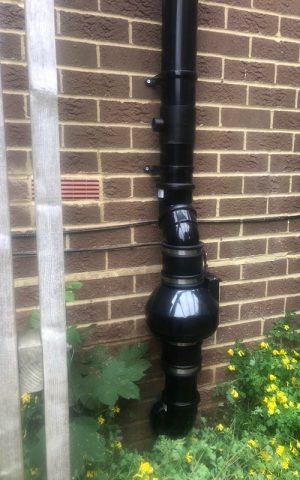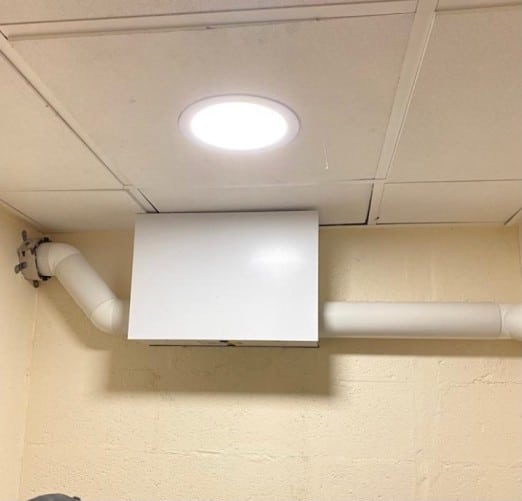
Here at PropertECO, we are one of the leading radon testing companies in London. Radon gas in London may not be as prevalent as areas such as the South West, but, it is still something that property owners in London still need to be aware of.
Radon gas is an issue that can affect properties, and their occupants, across the UK but isn’t that well known. It is however responsible for over 1,100 deaths from lung cancer per annum. This places radon in second place, behind smoking, as a leading cause of lung cancer in the UK.
If you were to look at the UK Health Security Agency (formerly PHE) radon map, you would notice that some areas of London are classified as ‘affected areas’. For example, in Stratford, Greenwich and Lewisham 1-3% of homes are estimated to contain radon concentrations above the residential ‘action level’ of 200 Bq/m3.
The only true way to know if your property has high radon levels is to carry out a radon test. There are two types of radon test kits that can be purchased online. These are the 10-day radon screening test or 3-month radon test kits.
A 10-day radon test kit is useful when you need quick radon test results, e.g. if you are looking to purchase or sell a property in London and a quick turnround is required as part of the home buying/selling process.
A 3 month radon test kit is however, is what we would recommend as this provides a more accurate reading. Factors such as weather can have an effect and fluctuate the radon levels over a period of time. A 3 month test kit allow these factors to be taken into consideration.
London is known for having a high number of basements in the area, which is good for increasing property values however, basements are also prone to high levels of radon.
Basements are vulnerable to high levels of radon for several reasons:
The UK Health Security Agency (formerly PHE) advises that even if a property is in a lower probability risk area (white on the map), radon testing should be considered if there is a basement. The Health & Safety Executive requires all workplaces with basements to be tested for radon.
Depending on the size of the property, there should be one radon detector placed on the ground floor of the property and one on the first floor. If the property has a basement, one should certainly be placed in there too.
If you are looking to carry out testing in a commercial property, such as offices, then additional detectors will need to be placed. PropertECO are able to advise and assist to ensure testing is caried out in line with current legislation.
Under the Health and Safety at Work etc Act 1974, employers must ensure the health and safety of employees and others who have access to their work environment. The Management of Health and Safety at Work Regulations 1999 require the assessment of health and safety risks.
All employers should carry out a radon risk assessment and this should include radon testing if the workplace is located in an ‘Affected Area’ or if it has a basement that is occupied for at least 50 hours per year, regardless of geographic location.
In 2017, the Ionising Radiation Regulations was updated (IRR17). If radon concentrations exceed 300 Bq/m3 in any part of the workplace, action must be taken to reduce the exposure to staff. This can be achieved either via restricting access to the areas in question or, more commonly, carrying out remedial works to reduce the radon level.
We have tested some of London’s most famous landmarks for radon in order for them to achieve the necessary level of health and safety compliance.
If you would like some further advice on protecting your employees from radon gas and ensuring you meet the current legislative requirements, then get in touch with PropertECO by calling 0800 046 6193 or contact us online.
Once you have purchased a radon test kit and the testing has been carried out for the allocated time frame (either 3 months or 10 days), you are then in a position to find out if you have high radon levels at your property. The first thing you need to know is that the units that are used for measuring radon are called Becquerels (Bq) and it is measured in cubic metres of air (/m3).
The average radon level for households in the UK is 20 Bq/m3 and the target level approved by the UK Health Security Agency (formerly PHE) is 100 Bq/m3. When you receive the radon test results and the readings are showing higher levels than the target level, then remediation works would need to be carried out to reduce the level of radon in the property.
To identify the most effective system to lower the radon levels in a property you will need to have a radon mitigation survey carried out. Having a mitigation survey will allow the surveyor to inspect the building and assess what type of mitigation will be best for the property.
There are two remediation systems that can be used – these are radon sumps and positive pressure systems. A radon sump works by drawing radon in the ground towards a void beneath the building before safely venting it away via pipework and an inline fan.

A positive pressure system is a form of radon reduction that works with the installation of a specialist fan system within the property.
The positive pressure system draws in clean air from outside of the property and then disperses clean filtered air throughout the property. This then raises the internal air pressure slightly and inhibiting the ‘suction’ effect that causes radon to be drawn in from the ground.

The only way to truly find out if a London based property is suffering from high radon levels is to purchase a radon test kit. You can purchase radon test kits via our online Radon shop.
If you have already purchased radon detectors and want to know how to reduce the radon level in your property, then contact one of our experts at PropertECO for more information. You can get in touch using the form down below or calling 0800 046 6193
"*" indicates required fields